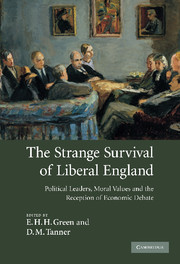 The Strange Survival of Liberal England
The Strange Survival of Liberal England Book contents
- Frontmatter
- Contents
- Acknowledgements
- List of abbreviations
- List of contributors
- Introduction
- Part I Economic ideas and political leaders
- Part II The use and abuse of economic ideas: Keynes and his interpreters
- Part III Economic forces and their significance
- 8 Where did it all go wrong? Cultural critics and ‘modernity’ in inter-war Britain
- 9 Moral choice and economics: British political economy in the twentieth century
- Index
8 - Where did it all go wrong? Cultural critics and ‘modernity’ in inter-war Britain
Published online by Cambridge University Press: 04 July 2009
- Frontmatter
- Contents
- Acknowledgements
- List of abbreviations
- List of contributors
- Introduction
- Part I Economic ideas and political leaders
- Part II The use and abuse of economic ideas: Keynes and his interpreters
- Part III Economic forces and their significance
- 8 Where did it all go wrong? Cultural critics and ‘modernity’ in inter-war Britain
- 9 Moral choice and economics: British political economy in the twentieth century
- Index
Summary
‘The history of twentieth-century Britain threatens to become a history of decline, centred on the question: where did it all go wrong?’ Peter Clarke's observation, from the introduction to Hope and Glory: Britain 1900–1990, refers primarily to matters connected to loss of Great Power status and to diminishing economic competitiveness. But the ‘where’ and the ‘all’ in this rhetorical question also invite us to consider a related set of questions. Diagnoses of a more deep-seated cultural decline became commonplace, and anxieties about the morally debilitating character of ‘modernity’ enjoyed a particular prominence in cultural commentary in the first half of the century, above all in the inter-war years, the period on which this essay will focus. In their most interesting form, these diagnoses were not merely free-standing denunciations of selectively perceived current trends: they relied upon an interpretation of English (and sometimes more general) history that reached back into earlier periods for their explanations, thus making the question of ‘where’ it ‘all’ went ‘wrong’ a topic, or series of topics, on which historical – and, particularly prominent and influential in this period, literary-historical – scholarship fed into wider public debate.
At the heart of such polemical analyses by cultural critics lay, I wish to propose, a challenge to the category of ‘the economic’, the central analytic category presumed by those discussions of the relation between policy and prosperity which, in one form or another, constitute much of the subject-matter of the other essays in this volume.
- Type
- Chapter
- Information
- The Strange Survival of Liberal EnglandPolitical Leaders, Moral Values and the Reception of Economic Debate, pp. 247 - 274Publisher: Cambridge University PressPrint publication year: 2007
- 3
- Cited by


